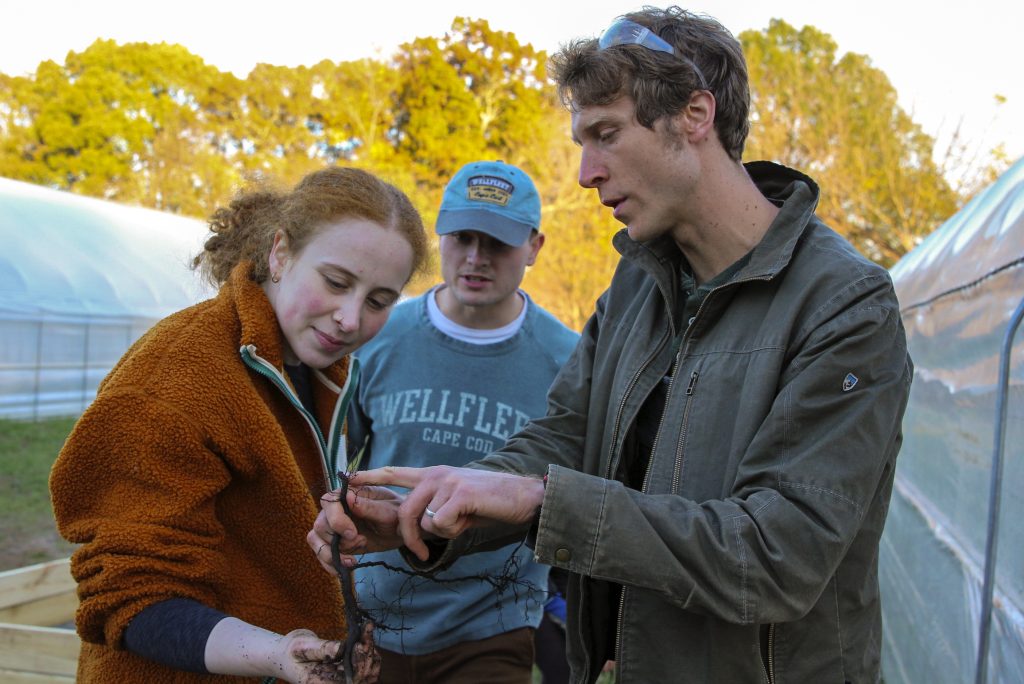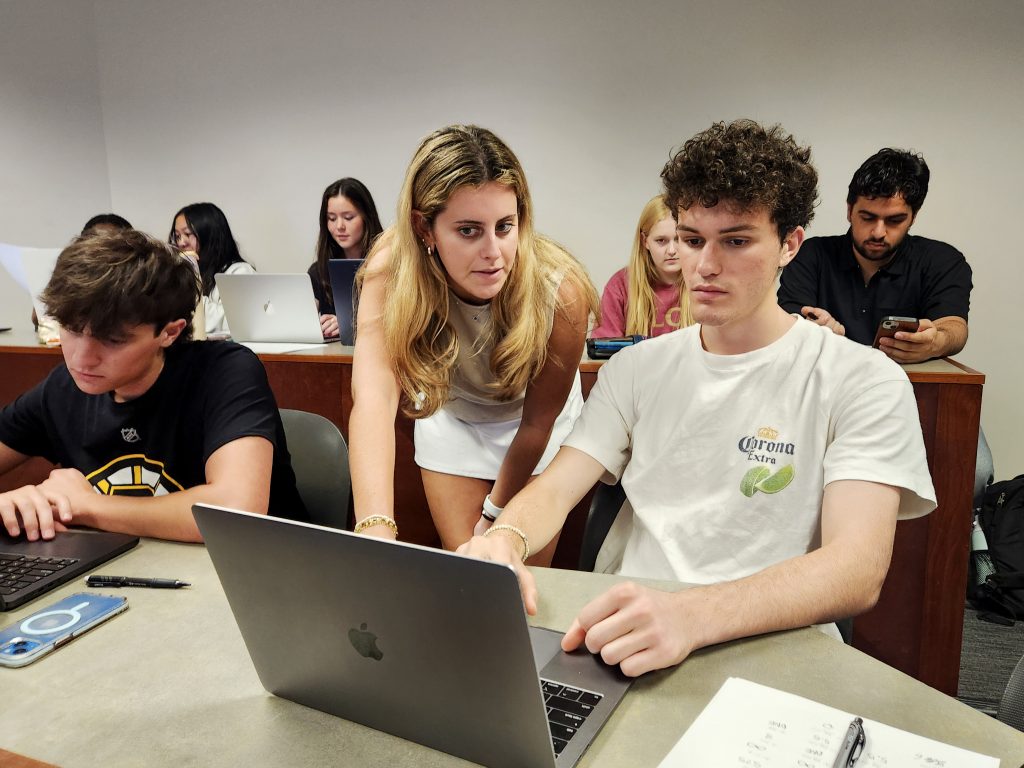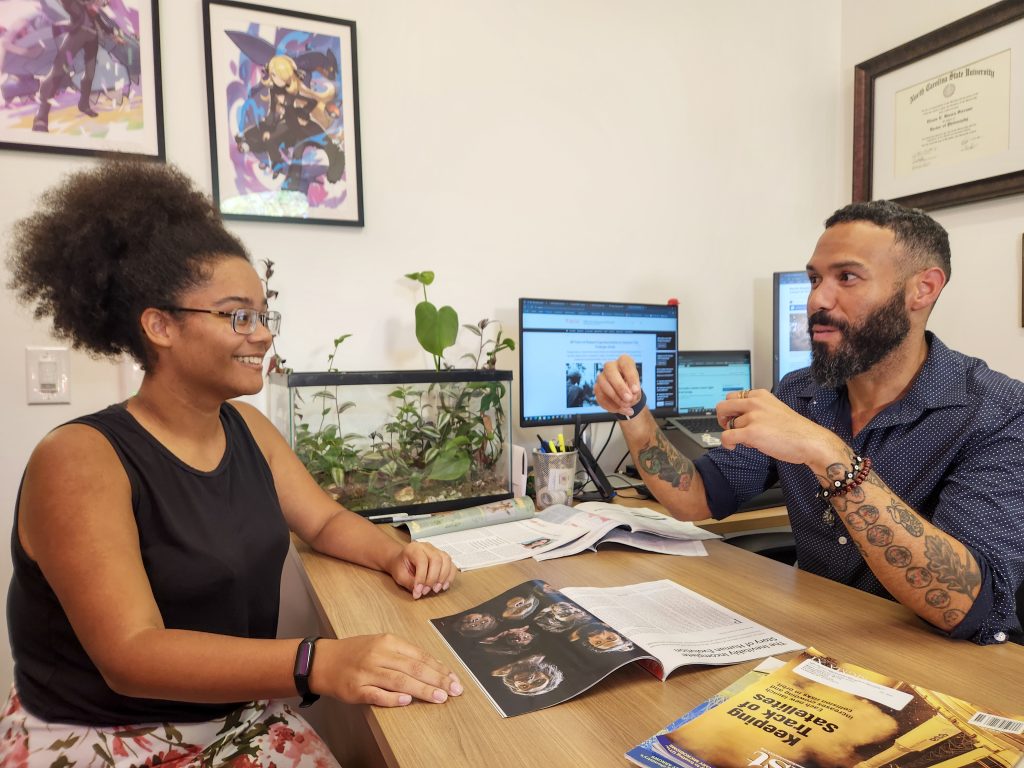- Home
- Academics
- Arts & Sciences
- Elon’s IE3 Projects
Elon’s IE3 Projects
Elon’s Inclusive Excellence in STEM Projects
Supported by the Howard Hughes Medical Institute’s Inclusive Excellence 3 grant, we are pioneering approaches to STEM teaching by creating environments where students find belonging and are empowered to succeed. Projects funded focus on the experience of introductory level students and include peer-to-peer mentoring projects, professional development projects, curriculum innovations, and projects aimed at building community among students historically underrepresented in STEM education.
- Contact the team to learn more about pilot project funding or apply for funding using this form.
Some recently funded programs include:
Seeding Environmental Justice in the New EcoVillage LLC
How can we encourage sustained action for environmental justice?
 The EcoVillage Living-Learning Community (LLC) is a new initiative at the Environmental Center at Loy Farm, inviting 12 students to engage in the natural environment through sustainably built housing and a community centered around environmental justice, wellness in nature and experiential learning.
The EcoVillage Living-Learning Community (LLC) is a new initiative at the Environmental Center at Loy Farm, inviting 12 students to engage in the natural environment through sustainably built housing and a community centered around environmental justice, wellness in nature and experiential learning.
Funding from the IE3 grant will jump-start the community’s base of knowledge around environmental justice through a three-part race equity training led by Seeds of Change Consulting. Students will learn about food justice and equity, analyze systemic inequalities in food systems, and take action to build advocacy. Engaged in challenging conversations, students will leave the training with a foundation of knowledge that sets the tone for work and life in the LLC for years to come.
Project leads: Kelsey Bitting, assistant professor of environmental studies, and Jacob Rutz, lecturer in environmental studies
Summer Faculty Institute on Supporting Neurodivergent Students
Elon’s faculty strive to meet students where they are.
Last summer, faculty from across Elon’s STEM programs participated in a three-day institute to re-imagine courses with neurodiversity in mind. They reflected on pedagogy, assignments and modes of assessment informed by recent research on the needs of neurodivergent students. They left with concrete, actionable plans for future courses that will be more intentionally supportive of all students. The institute was a joint initiative between Elon’s Koenigsberger Learning Center and the Center for the Advancement of Teaching and Learning.
Project leads: Alexa Darby, professor of psychology; James Holsinger, executive director of the Koenigsberger Learning Center; Monica Isbell, director of disabilities resources; Norma Rodriguez, assistant director of learning assistance; and Paul Tongsri, assistant dean for student success and retention.
Supporting Peer-to-Peer Connections in Mathematics and Statistics Through a Learning Assistants Program
Student success accelerates within communities of support.
 A team of undergraduate learning assistants are available to students in the fast-paced, technology-heavy MTH 1510 Calculus 1 and STS 2120 Statistics in Application courses. Learning assistants in these pre-requisite courses facilitate in-class practice and active learning. Weekly out-of-class supplemental instruction sessions provide additional opportunities to master concepts in a less formal, supportive environment.
A team of undergraduate learning assistants are available to students in the fast-paced, technology-heavy MTH 1510 Calculus 1 and STS 2120 Statistics in Application courses. Learning assistants in these pre-requisite courses facilitate in-class practice and active learning. Weekly out-of-class supplemental instruction sessions provide additional opportunities to master concepts in a less formal, supportive environment.
Feedback from the pilot program showed positive outcomes and experiences, with students encouraging others to register for sections with learning assistants.
Project leads: Kristen Mazur, associate professor of mathematics and statistics, and Ryne VanKrevelen, senior lecturer in statistics
Advancing Inclusive Excellence in STEM Through an Integrative Neuroscience Course
Elon’s Neuroscience Program begins with an inclusive foundation that creates a community of learners.
This project creates an introductory neuroscience course that centers diversity, equity and inclusion and provides a foundation for integrating these themes across the neuroscience curriculum. The course will launch in spring 2024. Grant funds support the design of inclusive learning materials, student engagement initiatives that grow Elon’s neuroscience community, and professional development opportunities for faculty and staff.
Project leads: Aaron Piepmeier, associate professor of exercise science; Will Schrieber, associate professor of psychology; Lynea Witczak Oldfather, assistant professor of neuroscience; and Matt Wittstein, associate professor of exercise science.
Introducing History and Ethics of Biology into an Introductory Seminar
Elon students will learn to think critically about science, ethics and history.
 Revamping the introductory seminar in biology to align with Elon’s Advancing Equity Requirement, all sophomore biology majors will concentrate on effective scientific communication while examining bioethics and history of science. Students will interrogate science as a system, see its biases and limitations, explore their identity in science as students and future professionals, and develop new and different ways science can be performed to address current issues like rebuilding trust between the scientific community and historically marginalized groups.
Revamping the introductory seminar in biology to align with Elon’s Advancing Equity Requirement, all sophomore biology majors will concentrate on effective scientific communication while examining bioethics and history of science. Students will interrogate science as a system, see its biases and limitations, explore their identity in science as students and future professionals, and develop new and different ways science can be performed to address current issues like rebuilding trust between the scientific community and historically marginalized groups.
Project lead: Efrain Rivera-Serrano, assistant professor of biology
Rivera-Serrano is also collaborating with students to develop a community of LatinX student leaders pursuing health care professions.